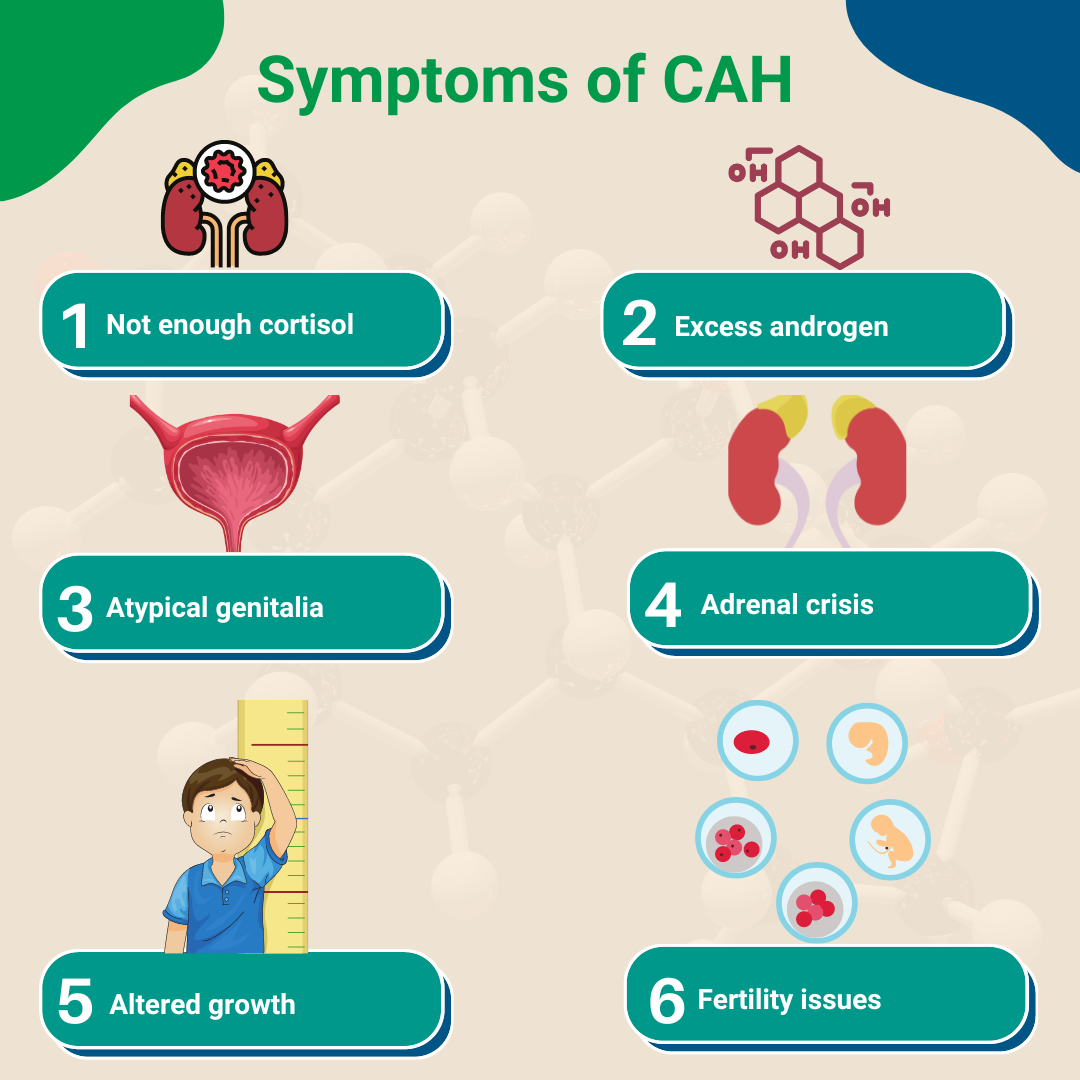Preventive Healthcare
What is Congenital Adrenal Hyperplasia (CAH): Symptoms, Treatment and Causes
4333 Views
0

Congenital adrenal hyperplasia is a group of inherited autosomal recessive disorders characterised by the missing or deficiency of an enzyme required to produce a specific hormone. This deficiency does not allow the body to make one or more hormones and can, in turn, cause the overproduction of another hormone precursor to compensate for this loss.
What is Congenital Adrenal Hyperplasia?
Congenital adrenal hyperplasia (CAH) is a genetic disorder typically affecting the adrenal glands. These glands are walnut-sized organs usually located in pairs above the kidneys. They are responsible for producing essential hormones like:
- Cortisol: The hormone that helps regulate your body's response to illnesses and stress.
- Aldosterone: This is a mineralocorticoid that regulates the levels of sodium and potassium in the body.
- Testosterone: Androgens like testosterone, the male sex hormone needed for growth and development in both men and women, are also produced in the adrenal glands.
People with CAH usually experience a gene mutation which can result in the lack of an essential enzyme that the body needs to produce these hormones.
There are two main types of CAH, namely:
- Classical CAH: This is a rare form of CAH that is more severe than its counterpart and is typically detected at birth or during early infancy.
- Nonclassic CAH: It is a milder form of CAH that is more common and milder than classic CAH. It is usually identified later in childhood or early adulthood.
While there may not be a known cure for this condition at the moment, with treatment, most people with CAH can manage the condition and live their lives to the fullest.
Causes of Congenital Adrenal Hyperplasia
People usually have two adrenal glands that are located at the top of both kidneys that are responsible for the production of various hormones. One of the common causes of CAH is a lack of an enzyme known as 21-hydroxylase. This is why CAH is sometimes known as a 21-hydroxylase deficiency.
Since CAH is also a genetic disorder, it is inherited from the parents and has been present since the child's birth. A child is at risk of having CAH if both parents either have CAH or are carriers of the genetic change that causes CAH.

Symptoms of CAH
CAH symptoms differ based on the gene that is affected and the level of enzyme deficiency. Here are some common symptoms you may find in individuals with CAH:
Classic CAH
- Not enough cortisol: Classic CAH inhibits the body from producing sufficient cortisol. This causes issues with maintaining energy levels, normal blood pressure, and blood sugar. It can also cause difficulties during illnesses.
- Adrenal crisis: Those who suffer from a lack of cortisol, aldosterone, or both may have an adrenal crisis which, if not treated, can be life-threatening.
- Atypical genitalia: Congenital adrenal hyperplasia in females may have genitalia that appears different, and they may have enlarged clitoris that resembles penises or closed labia that look like the scrotum. The urinary opening and vagina may also appear to be one opening instead of two separate ones. However, the uterus, ovaries, and fallopian tubes often develop normally. Male infants with CAH do not often display this symptom.
- Excess androgen: Excess male sex hormones in both men and women can cause symptoms such as early puberty or shorter height. You may also observe other signs of puberty, such as the growth of pubic hair from a young age. Some individuals also experience acne. An excess of androgen in females results in increased facial hair, deepening of the voice, and excessive body hair.
- Altered growth: In this case, you may notice rapid growth in kids during childhood, but their final height is lower than average.
- Fertility issues: Irregular periods or not having periods at all can indicate CAH in females. Fertility issues can also be noticed in males with CAH.
Nonclassic CAH
The symptoms of nonclassic CAH are often not present when the child is born; some individuals with this disorder may never display any physical symptoms. As this kind of CAH becomes apparent only in early adulthood or late childhood, it cannot be identified during a routine blood screening for infants.
A lack of cortisol can sometimes be the only indicator of CAH in the individual, but there are also other signs like:
- Irregular menstrual periods, no periods at all, or trouble getting pregnant
- Excessive body hair, facial hair, and a deep voice
- Early appearance of signs of puberty and pubic hair in both men and women with the disorder
- Acne
- Rapid growth
Congenital Adrenal Hyperplasia Treatments
Medication, especially hormone replacement therapy, is one of the main treatment options for CAH, and it helps bring your hormones back to normal levels while controlling the symptoms.
A surgery called feminizing genitoplasty is a standard treatment option for girls between the ages of 2 to 6 months. This procedure helps change the look and function of infants with CAH.
To Sum Up
Understanding the symptoms of CAH can help with early diagnosis and treatment of CAH. There are also in-utero tests that can help pregnant mothers learn if their baby is at risk of the genetic mutation that results in CAH and take the necessary steps to remedy the situation.
Metropolis Healthcare has a range of prenatal blood tests that can identify health defects in the mother or baby, Check out the entire list of available tests today.













1701259759.webp)









 WhatsApp
WhatsApp